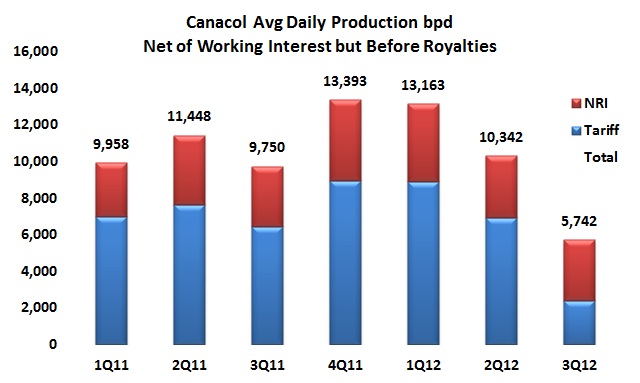Villavicencio residents are upset about all things hydrocarbons it seems. They marched on city hall to complain about Ecopetrol and on the Llanogas distribution company offices to protest high prices. These are not isolated incidents in the same week. They would seem to be fomented by community leaders for broader political purposes, but which tap into a vein of discontent.
Not much new this week except a major fine on Ecopetrol subcontractor and subsidiary Ecodiesel for US$333.000 for refusing to negotiate with the union which the USO says is the lowest fine that can be levied in this case. Otherwise, the Termotécnica dispute drags on.
The forum “Sustainable communities and oil”, organized by the ANH and national weekly news magazine Semana, will be held in Bogota on December 7. (As reported by the business magazine Dinero)
(The USO is the Colombian petroleum workers union. Unrepentantly radically left, it often seems trapped in some Marxist-Leninist twilight zone from before the fall of the Berlin Wall or perhaps before the Second World War. Still its capacity for mischief is unmistakable and so we believe it is important for oil and gas industry stakeholders to keep track of what they are up to. We will summarize major news items from their webpage or other sources and publish the summary every Monday. We will reproduce the tone of their items while not agreeing with their messages.)
(The USO is the Colombian petroleum workers union. Unrepentantly radically left, it often seems trapped in some Marxist-Leninist twilight zone from before the fall of the Berlin Wall or perhaps before the Second World War. Still its capacity for mischief is unmistakable and so we believe it is important for oil and gas industry stakeholders to keep track of what they up to. We will summarize major news items from their webpage or other sources and publish the summary every Monday. We will reproduce the tone of their items while not agreeing with their messages. )
Prior Consultation is a constitutional right of Colombian ethnic groups. This right requires them to be consulted before the development of projects that may impact their sacred territories. However, many indigenous groups complain that neither the government nor the oil and mining companies respect this right
The Colombia-Canada Chamber of Commerce invited the Interior Minister to speak at lunchtime during their Dialogue Canada event. A last minute request by the President pulled Fernando Carrillo out of the event and his Vice Minister for Participation and Equality, Anibal Fernandez de Soto spoke instead. Fernandez de Soto’s role includes responsibility for the community prior-consultation process, which has much of the hydrocarbons industry concerned. His remarks were woven around the Farc peace process, both the current negotiations and the post-conflict phase.
Earlier we reported that Maurel & Prom have come under fire for seismic testing in Boyacá. Residents claim that explosive charges damaged houses and ruptured water pipes, leaving residents of one municipality without water for five days. National radio network W Radio took up the residents’ cause and made the story a central part of its morning program, which enjoys the country’s highest audience rating. Today at the Colombia-Canada Chamber of Commerce’s Dialogue Canada event, National Hydrocarbons Agency (ANH) head Orlando Cabrales Segovia gave his point of view.
MILA (Integrated Latin American Market) is the alliance between the stock exchanges of Colombia, Peru and Chile. Of the 861 companies that are part of MILA (Integrated Latin American Market) Ecopetrol is the only Colombian company that reached the international standard for corporate transparency.

Just a few short weeks after filing its fiscal year-end results, Canacol reported its 3Q12 calendar (1Q13 fiscal) results and the story was not a happy one. Revenues were down and the company reported a net loss of US$6.2M, its worst since 2010. Revenues were down because production was affected by a number of community blockages. The shift from so-called “Tariff” to normal production (which the company labels NRI) in the Rancho Hermosa block also had an impact.